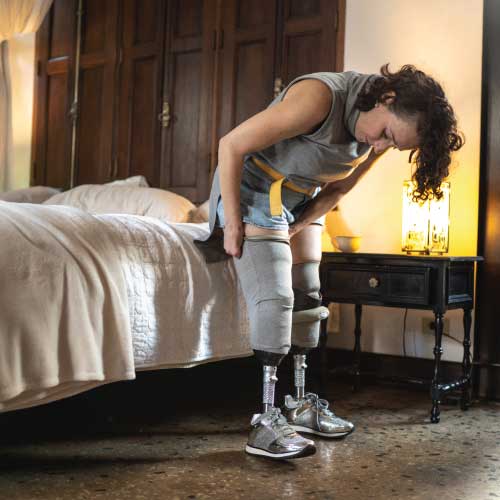Paralympian Loses Appeal to Use Prosthetic Legs at the Tokyo Olympics
Blake Leeper, an American Paralympic runner who uses two prosthetic legs, lost an appeal to qualify for the Tokyo Olympics slated for July 2021.

The Switzerland-based Court of Arbitration for Sport (CAS) upheld a decision by World Athletics, the global governing body of track and field. The sporting body ruled that Leeper got a competitive advantage against non-disabled runners because of his prosthetic legs' added height.
This decision means that the 31-year-old bilateral amputee cannot compete in the Olympic Games or any World Athletic Series competitions with his current prosthetic legs. However, Leeper still has a chance. He can challenge the CAS ruling at the Swiss supreme court before the Olympics opens.
The formula for body dimensions
The arbitrator ruled that Leeper would stand 5'9 based on the proportions of his upper body. However, his prosthetic limbs give him the legs of a 6'8 man. According to the sporting body, the additional leg length gives Leeper an advantage of several seconds.
Leeper said that the rules are racially biased against Black athletes in a statement released by his lawyers. His legal team also noted that the height limit was based on data from "height proportions of Caucasians and Asians."
According to Jeffrey Kessler, Leeper's lawyer, the arbitrator arrived at 5'9 using a formula from a study on White runners, which was tested against Asian runners from Japan and Australia. This part of the decision, according to Kessler, is racially discriminatory against Black athletes and thus against public policy.
Both Leeper and Kessler believe that the sporting body disregarded the potential differences in body proportions between elite Black runners and other populations.
Shorter prosthetic legs and a partial victory
After this ruling, Leeper could still, in theory, compete against non-disabled runners with shorter prosthetic legs. However, Leeper stressed that this is not feasible. He has been running at this height for a decade. Switching now would throw him off his game.
Kessler added that Leeper's height would have met World Athletics' standard before it was changed in 2018.
On a positive note, Leeper's case paved the way for other bilateral amputee runners. CAS agreed to shift the burden of proof from the athlete to the sporting body. World Athletics would now need to prove whether prosthetic legs give a competitive advantage or not. According to Leeper's lawyers, this development is a significant victory for all disabled athletes.
This case is similar to the one lodged by Oscar Pistorius. Back then, World Athletics (formerly known as IAAF) had to prove that his prosthetic limbs gave him an unfair advantage against non-disabled athletes. In 2015, the sporting body changed the rule that allowed an adaptive runner to prove his/her prosthetic legs did not grant an advantage.
Leeper continues to train and fight. Kessler hopes to take this case to the Supreme Court of Switzerland, which can override a CAS arbitration ruling. He believes that a decision could be made just in time for Leeper to qualify for the Tokyo Olympics.










































































